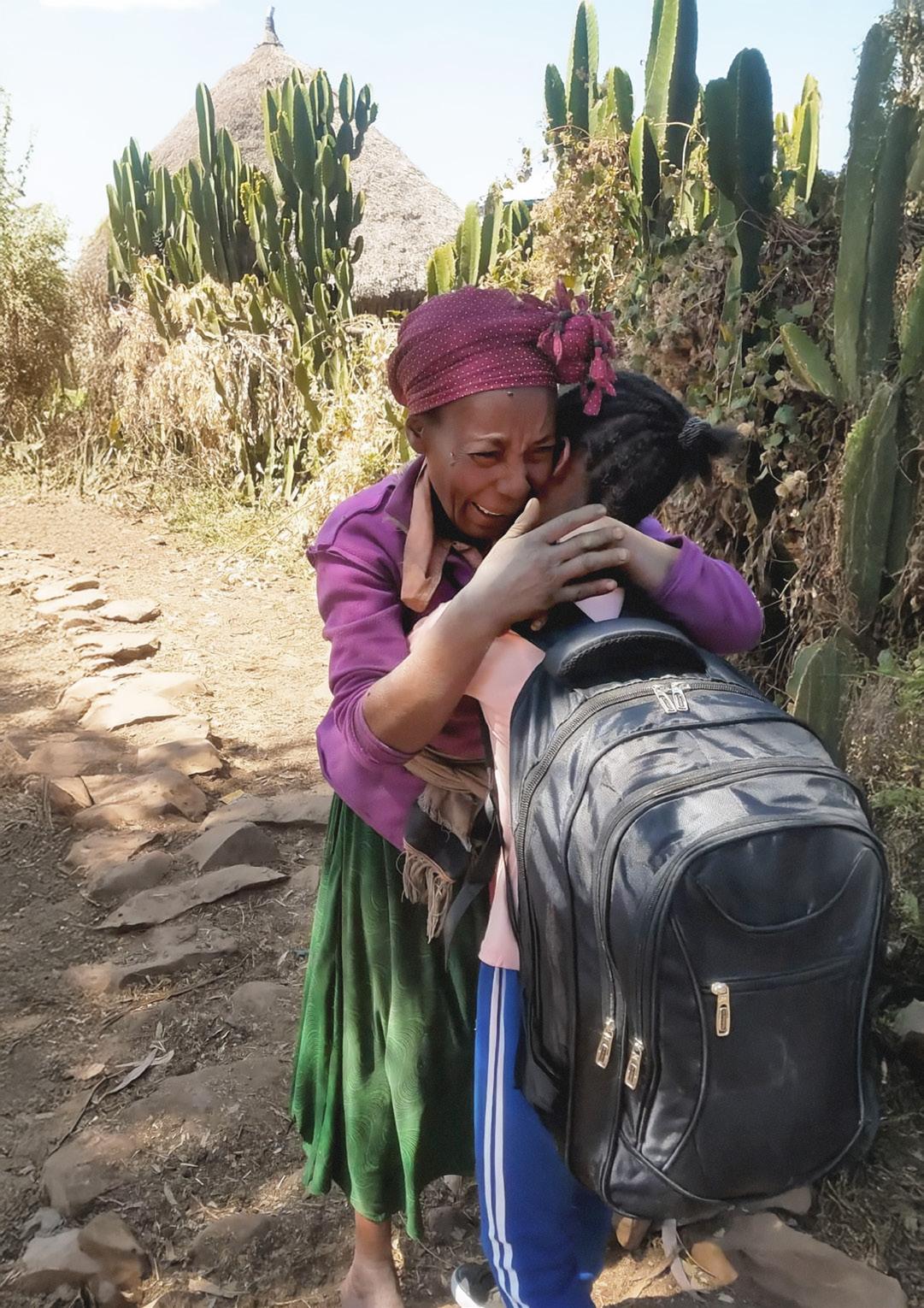




I’m proud to present this latest Annual Review, which highlights the global impact of Hope for Justice’s work. The stories, statistics, and testimonials from others speak volumes about the lives we’ve touched and the progress we’ve made. Every day, I’m inspired by our incredible staff, and I remain deeply grateful for the generosity of our donors, the dedication of our volunteers, and the wisdom of our Board. I want to thank everyone who has played a part in enabling our projects and programmes to reach more than 150,000 people in a single year.
It has been a challenging time for charities and non-profits. Funding sources have diminished, the cost of living has affected giving, and global instability continues to grow. Yet we’ve adapted, innovated, and remained focused on making the greatest possible impact with the resources available.
One example is our work in Uganda’s Karamoja region, where poverty rates are higher than the rest of the country and more than half of children are thought to be in child labour. This is an area with immense challenges in geography, welfare, and lack of infrastructure and security. I’m incredibly proud of our teams and partners for the progress they’ve made in such a difficult environment in our work to improve the resilience of children and families to prevent and protect against exploitative child labour.
Through our new Step Change strategic framework, we want to focus not just on direct service delivery to victims and survivors, but instead to share what we do as widely as possible, helping partners and other organisations to innovate. We’re applying this approach across more of our programming, including the IMSA®® (Independent Modern Slavery Advocacy) Model in the UK. Having so many organisations engaged in
a framework we’ve shaped over 15 years is a major milestone. It reflects our shared ambition that every survivor should have access to an independent advocate.
I’m also proud of our pioneering RISE survivor services project and the work of our licensed investigators in the United States, our Lighthouse shelters supporting at-risk children, and our training courses that are equipping tens of thousands of people each year to respond more effectively to modern slavery and human trafficking.
Our long-term ambition is to influence governments and businesses to make the transformational changes needed to end modern slavery. Systemic change requires collaboration. That’s why our policy work is so important, and why we’re investing more time than ever in partnerships, including with international bodies like the OSCE and the UN, and networks that allow us to share best practice and learn from others.
At Slave-Free Alliance, we’re seeing more and more major companies come on board, even in a tough economic climate. Inflation and budget pressures make it harder than ever, but our team is working tirelessly to make it happen. It is fantastic to see businesses large
and small commit to take steps to protect their operations and supply chains against modern slavery and labour exploitation.
We know we’re up against a vast injustice, and sometimes the challenges might feel insurmountable. That’s why we choose progress over perfection. We’re aiming to get better month by month, even when resources are stretched.
That means listening, learning, and adapting. Our vision is to live in a world free from slavery, and this demands bold action. I hope you feel the momentum we’re building. We’re strengthening, expanding our reach, and deepening our impact. Thank you for being part of this journey. Together, we are changing lives, and shaping a future where freedom is possible for all.


Tim Nelson CEO, Hope for Justice
If you have questions or want to discuss ways you could partner with Hope for Justice, I’d be delighted to hear from you. You can reach me at tim.nelson@hopeforjustice.org
The shocking scale of human trafficking and modern slavery
77% of business leaders think there is modern slavery in their supply chains

Over 200 organised criminal gangs involved in modern slavery in the UK
1 in 5 girls (and 1 in 13 boys) are sexually exploited before their 18th birthday, usually via online enticement
19,125 potential victims identified in the UK last year, a record high
Third-largest criminal enterprise in the world, after counterfeiting and drug trafficking

Estimated 122,000 victims in the UK, mostly hidden away
Women and girls are 54% of all victims (commercial sexual exploitation: 78%)
49.6 million people in modern slavery:
• 19.9 million people in forced labour or criminal exploitation
• 1.4 million in domestic servitude in private homes
• 6.3 million in forced sexual exploitation (including 1.7 million children)
• 22 million people in a forced marriage they never agreed to £175 billion in illegal profits for criminals each year
Hope for Justice runs lifechanging anti-trafficking projects around the world. Find out more about exactly what we do over the page.
Iowa
Tennessee North Carolina Texas*
*Operational support only
**Slave-Free Alliance and operational support only
Hope for Justice was founded in 2008, when a small group of people passionate about seeing an end to modern-day slavery took the step from outrage to action. They brought together nearly 6,000 people at an event called The Stand, growing a movement and founding a charity dedicated to helping the victims and survivors of this terrible crime.
UK Ireland* Ethiopia Uganda
We proudly share our heritage with organisations who have joined with us, some of which have histories stretching back before the founding of Hope for Justice. We have been honoured that so many others have become part of the Hope for Justice family, including Abolition International (formerly The Home Foundation); Retrak in Uganda and Ethiopia; Break the Cycle 200; Lily Pad Haven; and No More Traffik in Northern Ireland.
Australia**
We run different programmes in different places, based on factors including local circumstances, funding, and the evidence base for different interventions. We ensure our work aligns with our overall Theory of Change.
We engage with victims of trafficking and those at-risk in their own spaces, to offer services, help and advice. We build trusting relationships and can connect those at risk with other programmes run by Hope for Justice or others. Through outreach, we also share anti-trafficking messaging with community groups, businesses, local government and others.
We identify and locate potential victims and survivors through outreach, training, referrals, or (in the U.S. only) through work by our licensed investigators. We seek to help them leave their situation, or get them to safety ourselves (where appropriate, and often alongside law enforcement), or seek a placement at a temporary shelter. We also offer other forms of assistance that help victims and survivors get towards their preferred outcome of recovery and safety.

Our Lighthouses in Ethiopia and Uganda are short-term shelters providing trauma-informed care and support for children who have been trafficked or are at high risk of exploitation. They are kept safe from the dangers of the streets or their previous circumstances while we assess their physical and emotional health. Our Lighthouses offer safety, nutritious food, therapy, catch-up education, life skills, and the chance for positive development through play and friendship.
While a child is at one of our Lighthouses, we try to trace their family and explore how best to return them safely home. Reintegration to biological or extended families is best, but only if they can provide safe care with a low risk of re-exploitation, as assessed by our social workers. The child must be an active participant in the decision. When reintegration is unsafe or impossible, we consider supported independent living plus vocational training. We do follow-up checks on each child’s welfare after reintegration.
RISE (Restore, Inspire, Strengthen, and Empower), based at our North Carolina Regional Center, improves the wellbeing, safety and selfsufficiency of survivors through trauma-informed care and support, therapy, community engagement and case management. We offer short-term care to meet emergency needs for up to 60 days, while long-term care is communitybased over the course of a year.
In the UK, our Independent Modern Slavery Advocates (IMSA®s) are a single point of trust, advocating for survivors during their recovery, helping them navigate complex support systems and criminal/civil justice processes and ensuring they get what they are entitled to. This can include access to stable housing, financial support, advice with their documentation and legal status and more. We ensure their voice is heard to shape their own future.


We offer accredited training via instructor-led sessions or online courses. We offer basic awareness and ‘spot the signs’ training for the public, and more specialist in-depth training for professionals who may encounter victims and survivors of modern slavery in their work.
Our work with victims and survivors informs our recommendations nationally and internationally as we seek to improve and strengthen laws, policy, practices, standards, structures and knowledge across the societies where we work.
Our community prevention programmes in Uganda and Ethiopia tackle the root causes of child trafficking and exploitation, such as poverty, lack of education about trafficking and unsafe migration, peer pressure on children to abandon their families to seek new opportunities, and cultural norms viewing children as economic assets.
Depending on the location and the specific needs of a community, our prevention programmes feature some or all of the following:
• Self-Help Groups and Village Savings & Loans Associations: Fixed groups (usually women) meet weekly and empower themselves financially and socially through pooled savings and loans, training in effective parenting, child protection, antitrafficking, and other skills.
Child Protection Clubs (in schools) and Hubs (in urban slums): Students or children meet weekly, supervised by a volunteer mentor, to learn about their rights and the dangers of trafficking and unsafe migration.
Active Citizenship: Releasing the potential of youth as changemakers in their own communities.
Child Protection Committees: Officials, police, schools, community members and religious groups work together to protect children and ensure reports of abuse are acted on.
Research plus Community Awareness Campaigns: Studying harmful social norms that make child trafficking more acceptable in a region, with the research then used to inform tailored educational campaigns that reduce the risk of trafficking.
• Youth Training: Small-business skills or apprenticeships to create opportunity and reduce vulnerability.
• Community Conversations: Bringing together domestic workers, employers, brokers and community leaders for structured discussions about exploitation, human rights and unsafe migration, then agreeing changes that benefit all.
Other functions that enable our programmes to be efficient, safe, legal, sustainably funded, and understood by the public. These include MEAL (monitoring, evaluation, accountability, and learning), fundraising, communications, risk management, IT, HR, finance, and security.
This year, Hope for Justice launched ‘Step Change’, a strategic framework that will guide the overall direction of our work until 2030. It acts as a scaffold for individual strategies and plans all across the organisation, many of which, like country-level programme strategies, are already in place.
At its core is our Theory of Change, a one-page roadmap diagram setting out the problem we are trying to solve, the principles we work by in doing this, the emerging strengths we have identified, and the two core ‘paths’ our anti-trafficking programmes will take.
Our five principles reflect our core values as an anti-trafficking organisation. These include a human rights-based approach that shapes our mindset, language, and interventions; and a person-centred ethos, ensuring the best interests of survivors always come first, even when that conflicts with other goals.
We’ve also identified three emerging strengths: external partnerships, ethical survivor inclusion, and global and local balance, leveraging our international reach while remaining deeply rooted in local contexts to ensure sustainable impact.
Finally, Step Change outlines two programming paths:
1. Direct support for survivors, such as Lighthouse programmes and advocacy services.
2. Amplifying impact beyond our own delivery, through policy advocacy, capacity-building for other organisations, and more.
Together, these elements form a cohesive framework to guide our work, ensuring we remain focused, values-driven, and impactful in our mission to combat trafficking.
As part of our focus on ethical survivor inclusion, Hope for Justice this year also launched our new Survivor Leadership Council. We believe that it is vital that people with lived experience of modern slavery have more involvement in our decisionmaking and strategy, and that the same is true for every anti-trafficking organisation.
Hope for Justice’s Survivor Leadership Council provides expert advice, guidance, and recommendations to Hope for Justice and Slave-Free Alliance. The initial members are:



Jane Lasonder, UK Chair
Emily Ngabirano, Uganda
Ronny Marty, U.S.
Biographies of all three are available at the Hope for Justice website and we thank them for their contributions so far.
Search: Survivor Leadership Council.
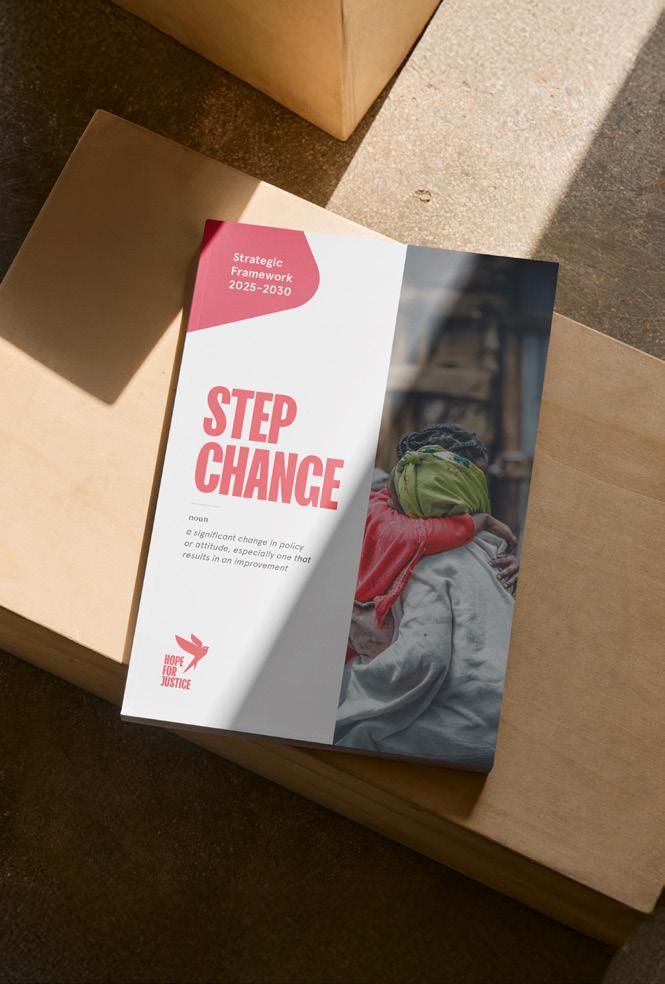
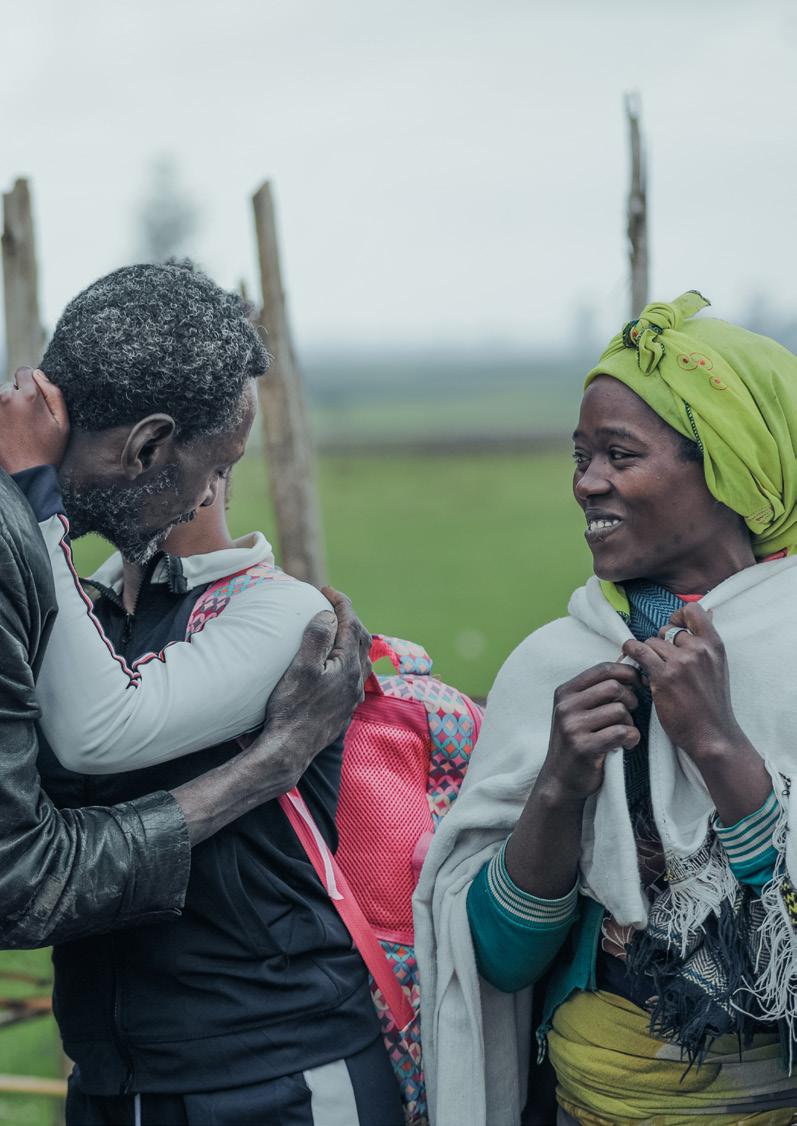

During the year ending 31st March 2025
155,137
73,327
475
8,805
731
6,979
people took our training courses in-person or online, learning to spot the signs of modern slavery, how to respond and how professionals can provide a trauma-informed response to victims
children and teenagers who had been victims of trafficking or at risk were reintegrated with their families or into safe independent living in their communities in our projects in Ethiopia and Uganda
people participated in our Self-Help Groups, helping build family and community resilience against human trafficking. 26,613 children benefitted from their caregiver’s participation in these groups
child survivors were cared for at our Lighthouse aftercare shelters during the year
people engaged through our anti-trafficking outreach work on the streets and in at-risk communities
“Hope for Justice and the GFWC share a common mission and vision: to live in a world free from trafficking. Human trafficking is a global problem, and Hope for Justice brings a global solution.”
General Federation of Women’s Clubs (GFWC) Pennsylvania
“Excellent report by Hope for Justice and partners on the positive impact of IMSA®s in achieving sustainable recovery. Survivor-led design should be the expectation, not the exception.”
Sarah Champion MP
“This coordinated effort exemplifies the power of community and interorganisational cooperation in protecting vulnerable children.”
Zawudu Jabir, Idir Coordinator, Ethiopia
“I’m so proud to be working as an ambassador for Hope for Justice and support the work that they do. Let’s together create a world that’s safe for us all to live in.”
Alicia Agneson, actor
“Richard Schoeberl is passionate, informed and the best in the business. Hope for Justice is truly a worthwhile organisation to support. One that saves lives, rescues those in need and educates the rest of us.”
Stephen Somers, VP Strategic Alliances & Initiatives, GardaWorld, the world’s largest privately-owned security services company
“Hope for Justice restored the trust I needed in the system, that it was still possible for justice to be done.”
Survivor of child sexual exploitation
“The victim support provided by Hope for Justice was instrumental in taking apart this organised crime network. The perseverance shown by Hope for Justice, to get the best outcome for all of the victims they supported, is testament to the outstanding work they do.”
Chief Superintendent Sheon Sturland, formerly of the National Police Chiefs’ Council (NPCC) Modern Slavery and Organised Immigration Crime Unit
“This is a very important cause here in our country, and I’m honoured to be a part of it and to lend my name and experience and help raise money for this important cause.”
George Hincapie, pro cyclist in 17 Tours de France and 5 Olympic Games
“Hope for Justice is a charity dedicated to fighting human trafficking and supporting victims… This committed team is working to end exploitation all around the world.”
The Rt Hon Theresa May, former UK Prime Minister
“We want to live in a world free from slavery. Truly an impactful talk from Tim Nelson.”
The Chartered Governance Institute UK & Ireland
“The UK is home to some truly remarkable charities, and Hope for Justice is among the most inspiring. Witnessing the integrity, professionalism, and impact of Tim Nelson and his team gives me genuine hope for our shared future. When such dedication meets such purpose, meaningful change becomes not just possible — but inevitable.”
Ali Serim, environmental strategist
“It’s inspiring to see such a collaborative, survivorcentered model being piloted at the national level. In my work supporting refugee girls and young women, I’ve seen firsthand the transformative impact of trusted advocates who can help survivors navigate complex systems and make informed decisions about their recovery.”
Helen Altshul, charity sector CEO
“When I was introduced to Olivia, an IMSA® at Hope for Justice, everything changed. She helped me understand legal processes during a judicial review and supported me through the most confusing and isolating times. Having someone in your corner who truly understands and advocates for you makes all the difference.”
Nancy Esiovwa, survivor and lived experience consultant
‘Thank you Hope for Justice and Slave-Free Alliance for all that you continue to do!”
Marcel van der Watt, President & CEO, National Center on Sexual Exploitation, United States
Below are a selection of nominations, shortlistings, awards and accreditations achieved by Hope for Justice this year and last year.
• Overall ‘Charity of the Year’ at the .ORG Impact Awards, and winner of the Diversity, Equity, and Inclusion category, 2023-2024
• Winner of the Foundation for Improvement of Justice's Paul H. Chapman Award
• Human Trafficking Interactive Training Award (Silver) – The Telly Awards
Winner of the SAS Hackathon (Americas region) for the creation of a pioneering visual dashboard showing forced labour by country, industry and commodity
• IMSA® Model Development Project (Hope for Justice) nominated for the Rebuilding Lives (Frontline Award) category at the Anti-Slavery Day Awards 2025

• Charity Film of the Year (nominated), for ‘Give Them Hope’
Jane Lasonder, Chair, Hope for Justice Survivor Leadership Council, shortlisted for Outstanding Contribution to Empowering Survivor Voices at Anti-Slavery Day Awards 2024


Registered with Australian Charities and Not-forProfits Commission, ABN: 28 639 382 782.
Achieving the Platinum Seal of Transparency on Candid.org (formerly GuideStar) demonstrates the progress Hope for Justice is making toward achieving our mission.

Hope for Justice is proud to be registered with the UK Fundraising Regulator, meaning we agree to ensure all of our fundraising is legal, open, honest and respectful.
Hope for Justice is legally compliant and registered for charitable solicitation in the United States.
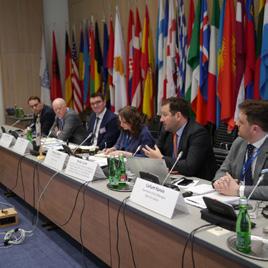
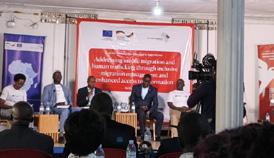
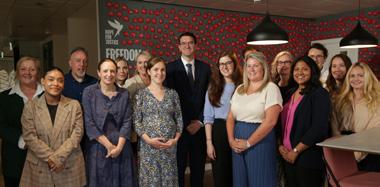
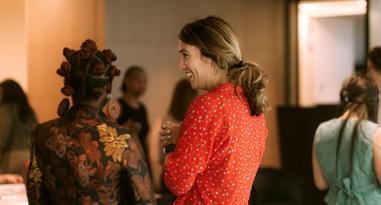







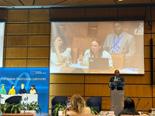
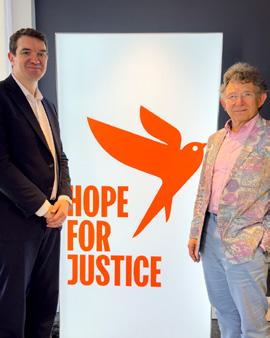


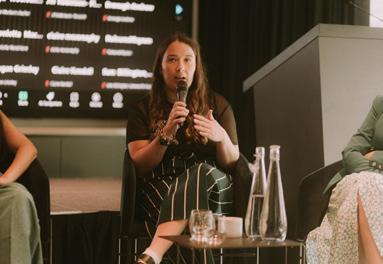

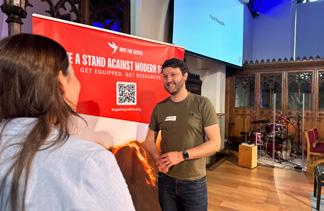
Our Lighthouses in Ethiopia and Uganda are short-term shelters providing trauma-informed care and support for children who have been trafficked or are at high risk of exploitation. They are kept safe from the dangers of the streets or their previous circumstances while we assess their physical and emotional health. Our Lighthouses offer safety, nutritious food, therapy, catch-up education, life skills, and the chance for positive development through play and friendship.
A police officer was found guilty and sentenced to six years in prison for sexually exploiting a girl he had employed as a domestic worker. Candace*, aged 14, bravely testified against her perpetrator in an Ethiopian federal court. The survivor had been brought to our Lighthouse shelter for safety after she reported what happened to her, and we helped her throughout the difficult process of giving evidence. She told Hope for Justice afterwards: “I was scared that I would end up in prison because the defendant was a police officer. However, I am now very happy to be safe.” Candace’s full story is at the Hope for Justice website.
The boys at one Lighthouse acted out legal proceedings during a simulation to prepare them for real court cases. They took on roles including police officer, judge, witness, clerk and counsellor. The children from Tuda Lighthouse in Uganda had fun, but there was a serious reason: they may soon be asked to stand as witnesses against their perpetrators. The simulation, run by a professional lawyer, reduced the anxiety they might feel about court. Michael Esalu, a teacher and Safeguarding Officer at the Lighthouse, said: “The safe space we created allowed them to confront their trauma, reclaim their voices and rebuild their sense of self.”
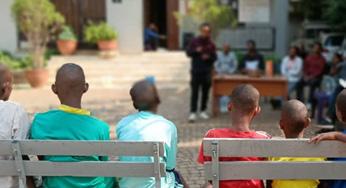





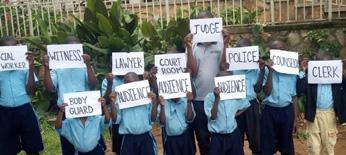






We are proud that the Ethiopian Government acknowledged our “outstanding contribution” to shelter services. The Certificate of Appreciation from the Ministry of Justice references Hope for Justice's work with those subjected to gender-based violence during their trafficking and exploitation. Our temporary Lighthouse shelters are a safe haven for children exposed to human trafficking or severely at risk. Feyisa Tefera Hika, Hope for Justice’s Director of Programmes in Ethiopia, said: “It was really a great honour. This highlevel recognition renews our commitment and energy to serve more survivors of human trafficking and modern slavery.”
Canaan Lighthouse in Ethiopia, one of three Lighthouse shelters directly run by Hope for Justice in Africa, celebrated the milestone of providing short-term aftercare to 3,000 boys since it first opened its doors 18 years ago. Survivors, officials, NGO representatives, law enforcement and other partners attended a celebration to mark the occasion. Wondimu Dirar, Lighthouse Project Manager, said: “We believe reaching 3,000 survivors is not just a number but a testament to the unwavering dedication of Hope for Justice and its staff in identifying and assisting victims of human trafficking and modern slavery in their journey to recovery.”
Children at one of our Lighthouses jumped for joy as they played parachute games as part of activities to improve their wellbeing. The boys at Tuda Lighthouse in Uganda engaged in classic games to develop their social skills and hand-eye coordination as well as simply having fun. One of the Lighthouse teachers said: “Survivors were actively engaged in sport activities featuring parachute games, ball throwing, crocodile in the water, and chasing games. These activities have promoted physical wellbeing, teamwork, and social skills while fostering a sense of joy and camaraderie.”
A former beneficiary of Hope for Justice returned to the aftercare centre where he was supported 20 years ago to share his inspirational story with young survivors. Hailu (not real name), now in his early 30s, spoke about the hardships he faced on the streets of Ethiopia’s capital and how our staff supported him. One of our team members, who worked at the Lighthouse when Hailu was there as a child, said: “He was so small when he joined but now he is a grown man with his own business, married and a father of two. He got emotional before giving his speech, and so did I. I’m so proud of him.”


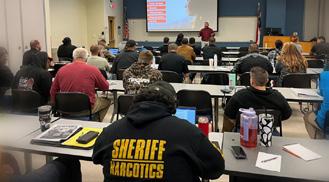
Hope for Justice trained more than 70,000 people this year, including School Resource Officers (SROs) – law enforcement officers who work in schools to protect children and prevent crime – at more than 50 schools across Middle Tennessee. Our U.S. Team Leader for Investigations & Training, Richard Schoeberl, who delivered this eight-hour training, said: “It is important to train these officers on the dangers children face, such as sextortion, exploitation and human trafficking. We are equipping these officers with the skillset to use in their day-to-day jobs in dealing with children who fall within the age bracket that we know is being targeted by perpetrators.”
A church leader safeguarded two boys from suspected trafficking while he was part-way through a two-day modern slavery awareness training session led by Hope for Justice. As Yohannes Fosha was travelling to the second day of the training, he noticed on the same bus a suspicious man with two children. The man gave inconsistent answers when questioned. “The training I received from Hope for Justice had equipped me with the knowledge to recognise and respond to this kind of situation,” Yohannes said. The suspected trafficker was arrested, and the two boys, 10 and 12, were safely reunited with their families.
Hope for Justice helped four children to safety after the car they were being transported in was intercepted by a law enforcement officer we had trained. Our team of licensed investigators were notified of the situation in the Western United States by a law enforcement officer and a U.S. family services professional. The officer had made a traffic stop and identified four unaccompanied minors in the vehicle, the youngest just three years old, and the oldest 14. Just weeks before, we had delivered High Intensity Drug Trafficking Area (HIDTA) training to the officer and a Department of Health and Human Services (HHS) representative involved in this case. Hope for Justice has trained thousands of law enforcement professionals this year, including county and city police departments, as well as federal agents such as those from the DEA.
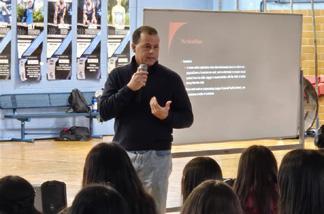



Online grooming and exploitation is an extremely fast-growing crime, and there is a direct link with in-person trafficking and abuse. Children can be especially vulnerable, which is why we have put effort into educating students, teachers and parents about this critical issue. One such training was at South Tama County School District in Iowa, where more than 400 students learned how to protect themselves from predators online thanks to training run by Hope for Justice’s Mark Herbst and Devon Greiter, who said: “Human traffickers are increasingly using digital platforms for recruitment and exploitation. This highlights the crucial importance of digital safety to prevent human trafficking and protect individuals, especially children, online.” Hope for Justice complemented our in-person training with a major awareness and fundraising campaign during Summer 2025 focused on keeping kids safe online.
Hope for Justice was pleased to partner with The National College in the UK to create two new courses for their platform which empowers educators with tools, knowledge and confidence to transform children’s lives. We contributed a general awareness course about modern slavery and human trafficking, plus another specifically about ‘county lines’, which refers to the networks and dedicated mobile phone lines used by criminals to move and supply drugs between cities and towns, often with younger people or at-risk people coerced into helping. Our Training Manager, Pete Kernoghan, is pictured here being interviewed as part of the promotion for the new courses.
Through a partnership with another non-profit organisation, Edovo, Hope for Justice’s anti-trafficking training and awareness materials are being accessed by thousands of incarcerated people in the United States. More than 70 learners each day are completing our Human Trafficking in the U.S. and Keeping Kids Safe in the Digital World online courses. This awardwinning training is reaching at-risk populations and helping to prevent future exploitation through education, skills and empowerment. Learner feedback has been extremely positive, with post-training knowledge-retention quizzes showing very strong results too, with an average score of 95.17%.

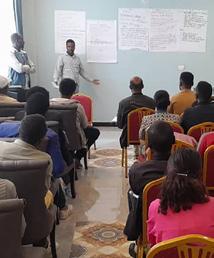

More than 200 people gathered at a Hope for Justice event to celebrate the impact of our Self-Help Groups in southern Ethiopia. The groups empower women by equipping them with skills and the means to start their own businesses, and they provide a community network from which women can build their social, economic and emotional strength. Members are also trained in antitrafficking. Ashenafi Letebo, Hope for Justice’s Monitoring, Evaluation, Accountability and Learning (MEAL) Officer for the region, said: “This gathering was a vivid reminder of the power of collective action and the impact it can have on the lives of individuals and their communities.”
Kinfegebriel Tadesse was one of dozens of educators trained by Hope for Justice to spot the signs of modern slavery at an event in February. This training proved vital when he noticed a 13-yearold schoolgirl displaying multiple indicators of exploitation. Just six months prior, the girl was orphaned when both her parents died of natural causes. She was taken into care by a relative, who made her work long hours without breaks. She was scared and in poor health. Kinfegebriel sensibly involved Hope for Justice, and we were able to help secure the girl’s welfare and conduct follow-up checks. A member of our Ethiopia team said the “timely intervention” was life-changing for the girl and also “serves as an inspiring example of how trained individuals can make a tangible impact in protecting vulnerable children”.
Young people were equipped to address unsafe migration and human trafficking this year in Kapchorwa, Uganda. Hope for Justice and partners supported those involved, including trafficking survivors, to set up social action projects to promote safe migration and prevent human trafficking. A discussion event about the project, featuring a speech by our Country Director, Florence Soyekwo, was shown on Ugandan TV in May 2025, reaching nearly a million people. She said: “The results are inspiring. Young people are busy driving change using their voices and solutions and are empowering their peers so they can protect themselves from unsafe migration and human trafficking.”
The British Council’s Better Migration Management programme is co-funded by the EU and the German Government’s international development ministry, the BMZ.
SURVIVOR SUPPORT THROUGH OUR LICENSED INVESTIGATIONS AND RISE PROGRAM

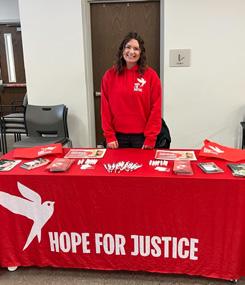

Among those helped by our RISE Program in North Carolina this year was a female sex trafficking survivor who had to attend hospital after being left with physical injuries during a sexual assault committed by her trafficker. At the time of contacting us, the survivor, who is in her mid-30s, was afraid, distraught and in need of emergency housing. Jeff Bolettieri, our U.S. Senior Investigator, who is based in North Carolina, said: “When survivors reach out, time matters. In this case, Hope for Justice provided swift, compassionate support, extending the survivor’s hotel stay and arranging transport so that she could access long-term aftercare. Every action, no matter how small, sends a powerful message: you are seen, you are valued, and you are not alone.”
Our new survivor support initiative in Middle Tennessee began in late 2023, and during 2024, the first two survivors graduated from the programme. We first engaged with one of these survivors during street outreach work, and after that helped them with emergency items like clothing and hygiene products, then to get their social security and welfare benefits such as SNAP. By the end of the programme they were far along enough in their recovery journey to secure a good job and be reunited with their child. The other survivor self-referred to our team. Today, both survivors are in stable housing and long-term therapy. Olivia Messina (pictured), who leads this work, said: “We are delighted that these survivors – our first two graduates from the Middle Tennessee programme – have been able to move to a place of real independence. We’re looking forward to continued success.” This work is supported with funding from the Office for Victims of Crime.
A female victim who was trapped in a perilous situation and wanted to escape from her trafficker was brought to safety by our Midwest team based in Iowa. Kayla*, in her early 40s, was desperate for assistance. Our team worked with law enforcement and other agencies to arrange Kayla’s travel to a safe location in Iowa and then onwards to an aftercare programme. Mark Herbst, Hope for Justice’s Senior Investigator in Iowa, thanked our law enforcement partners who help make our work possible, and said: “The ability to have incredible impact and seeing firsthand the transformation – from fear to hope – of a person who has been subjected to such horrible treatment is why we are on this mission.”
This page shows a selection of photos from our outreach work in the United States this year, on the streets, at community events and with partners. Chelsea Spence, our Senior Philanthropy Officer, had the opportunity to join one of these outreach walks, and had this reflection:
“Yesterday I had the chance to join our outreach team on the streets of Middle Tennessee --and it was powerful. As a fundraiser, I don’t always get to see our mission in action, up close. But walking alongside our team and community partners, handing out food and resources, and connecting with individuals, some of whom bravely identified as trafficking survivors, was a moving reminder of why this work matters. Up to 50% of unhoused individuals have experienced human trafficking. Hope for Justice is out there meeting people where they are, with compassion, dignity, and tangible support. I’m incredibly proud to help fund and fuel that work.”





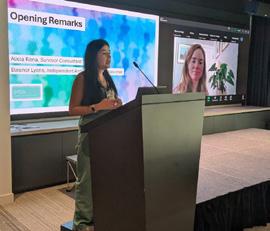


At a major event in London, Hope for Justice and partners launched a pilot to ensure survivors of modern slavery across the UK have access to an accredited independent advocate. Speakers included the Government minister with responsibility for modern slavery, and the Anti-Slavery Commissioner. Independent Modern Slavery Advocates® (IMSA®s) work alongside survivors to help them understand their rights and to navigate the complex systems and support services available in the UK, reducing their risk of being re-exploited. Survivors have helped shape the model and the pilot, under which IMSA®s will complete accredited training (a Post Graduate Certificate) and which will be rigorously tested thanks to a four-year, £1m National Lottery grant awarded in early 2025.
The value of the work of Hope for Justice was raised in Parliament multiple times this year, including by Jess Phillips MP, the Home Office Minister whose role includes modern slavery. She said: “Hope for Justice is very much part of the core group of those we take advice from in the Department, and I speak to Euan [Fraser, Hope for Justice’s Senior Policy and Research Advisor] regularly.” In the same debate, East Renfrewshire MP Blair McDougall called for more attention to be paid to the value of IMSA®s, while Worcester MP Tom Collins thanked us for first alerting to him certain facts about modern slavery in his constituency.
Among the scores of survivors supported by our IMSA®s this year was a man awarded more than £208,000 by the compensation authorities after his traffickers left him with life-changing injuries that mean he cannot work again. This is the largest monetary award Hope for Justice has ever seen a survivor of modern slavery receive from the Criminal Injuries Compensation Authority (CICA). Ellie Russell, IMSA® Model Hub Manager at Hope for Justice, said: “Without access to an IMSA®, it is highly unlikely that this survivor would have been able to access compensation, let alone receive the amount he has finally been awarded.”

‘Momentous’:
Hope for Justice is proud to have witnessed the critical moment that the Take It Down Act was signed into law during a ceremony at the White House. We have been a strong supporter of this legislation since its inception and were honoured to stand alongside other champions of the bill during the ceremony. The Act criminalises non-consensual intimate imagery, whether real or AI-generated (deepfakes). It requires social media platforms and other websites to remove such content within 48 hours of notice from a victim. Hope for Justice sees direct links between online exploitation and other forms of exploitation, including human trafficking. Sarah Butler, Hope for Justice’s U.S. Program Director, attended the ceremony and penned our organisation’s name on the signed document. She said: “Our commitment is to stand with survivors, and it was a huge privilege to have participated in this momentous step.”
Hope for Justice has been sharing our expertise with the Ethiopian Government’s Ministry of Women & Social Affairs department as part of their engagement with NGOs over the creation of a new marriage, family guidance and counselling manual. Hope for Justice promotes strong, resilient families because we know from our work that this can reduce the risk of children and young people being exploited. Biniyam Andargie, Hope for Justice’s Head of Social Work in Addis Ababa, said: “The bureau invited us through a formal letter to share our expertise and we willingly accepted because Hope for Justice is committed to addressing the root causes of modern slavery and human trafficking. We were pleased to contribute our professional insights to the Government’s endeavours.”
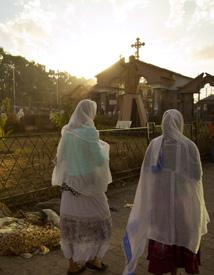

Hope for Justice is proud to have been invited to speak at the OSCE 25th Alliance Against Trafficking in Persons Conference. We joined anti-trafficking experts and leaders in calling for the 57 participating states of the Organization for Security and Co-operation in Europe (OSCE) to take urgent action on child trafficking. This global crisis has tripled in the past 15 years, with traffickers increasingly using online and digital platforms to recruit, manipulate and exploit victims. Representing Hope for Justice at the conference in Vienna were Phillipa Roberts, Head of Policy and Research, and Elaine Jones, Chief Operating Officer, whose intervention concluded with the words of Nelson Mandela: “Children are our greatest treasure. They are our future. Those who abuse them tear at the fabric of our society and weaken our nations.”
Hope for Justice’s UK policy team published major research reports and recommendations during the year, with launch events attended by MPs and other key decisionmakers. ‘Beyond Survival’, launched in Parliament in October, is about how the UK can improve access to justice for survivors of modern slavery, based on evidence from survivors themselves. Via workshops and interviews, we captured insights from across all four nations of the UK. We also published ‘Avoiding the cliff edge – working with young survivors of modern slavery as they turn 18’, again with substantial involvement from those with lived experience. The report was launched via a well-attended webinar, with speakers including the Anti-Slavery Commissioner. These reports and more are available at the Publications page on the Hope for Justice website.
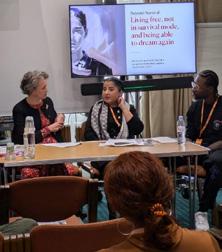

Hope for Justice warmly welcomed the introduction into the Senate of the Trafficking Survivors Relief Act and we were proud to be quoted prominently by Senators Gillibrand and Rubio in their news release accompanying this legislative step forward. This law would mean survivors of human trafficking could have non-violent criminal convictions or arrest records vacated and expunged if they resulted from having been a trafficking victim. Although their version of the Bill stalled at the end of the 118th Congress in early 2025, a fresh version with the same aims has since been introduced into the House with wide bipartisan support and is thought to have a strong chance to pass during the current 119th Congress.
We are proud of the part our team played in the development of Uganda’s new National Guidelines on Care & Support for survivors of trafficking, which at the time of publication were scheduled to be officially launched in October 2025. The Ministry of Gender, Labour & Social Development worked with Hope for Justice and the Rights Lab (based at the University of Nottingham), plus the Coalition against Trafficking in Persons in Uganda (CATIPU). Previously, there were huge variations and discrepancies in care, depending where survivors lived and the agencies involved. The new guidelines aim to improve this through a set of guiding principles and standard procedures for shelter services, case work, informed consent, physical and mental healthcare, trauma-informed counselling, material assistance, legal support, compensation, non-criminalisation, transnational co-operation, and survivor reintegration. This project received funding from the Global Fund To End Modern Slavery and the U.S. Government.
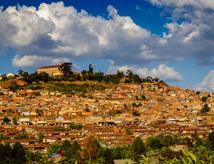
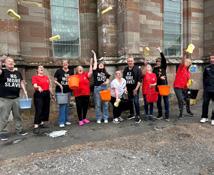

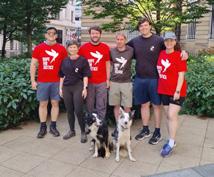
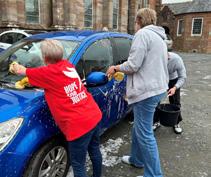


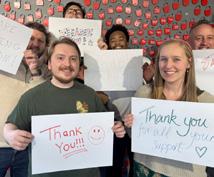
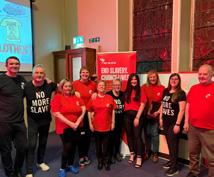
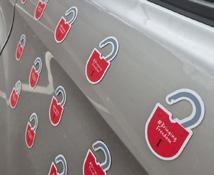



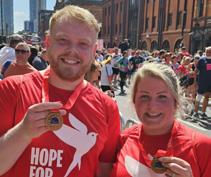

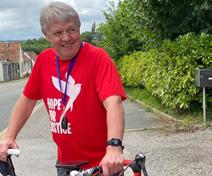
Thank you to everyone who took part in a Break the Cycle event in 2025 to raise funds and awareness! Whether by cycling 200 miles in a single day, or taking part in the Challenge rides or the 5K All Day run and walk, everyone who took part helped to change lives.

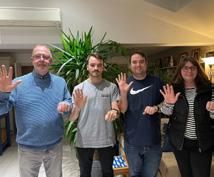

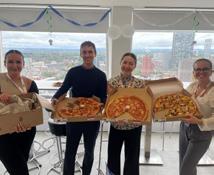

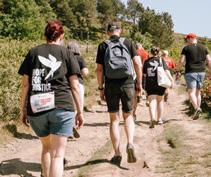
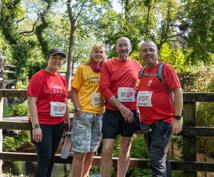

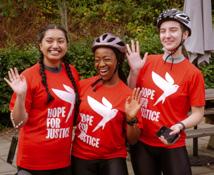
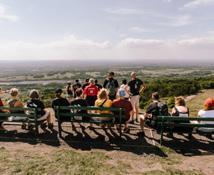
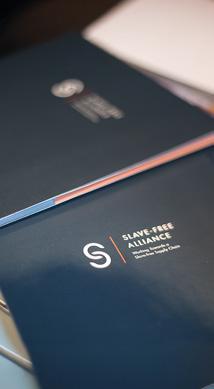
Slave-Free Alliance has a vision to become the leading global consultancy empowering businesses and organisations to protect their operations and supply chains against modern slavery and labour exploitation, while driving sustainable growth, expanding strategic partnerships, and leveraging technology to create lasting impact. Wholly owned by Hope for Justice, with all profits reinvested in charitable antitrafficking projects, Slave-Free Alliance has seen major success among employers since its launch in 2018, with 120-plus signed up members and a wide range of clients seeking consultancy, training and more, with members based in the UK, Australia, Norway and the United States.
“A strengthened focus on supply chain transparency”
Slave-Free Alliance has welcomed many new businesses as members this year, including several highprofile brands and household name companies. These have included accounting, financial, HR and payroll technology leader Sage; London St. Pancras Highspeed, which owns and operates the UK’s only high-speed railway and the stations along the route; Stagecoach, the UK’s largest bus and coach operator, which has more than 3,500 supply chain partners; and international gaming, leisure, and entertainment group The Rank Group, which called its partnership with Slave-Free Alliance “a step forward in our ongoing commitment to ethical business practices” and added: “This partnership strengthens our focus on transparency within our supply chain, helping us identify and manage risks.”


This year saw our first event hosted in Germany, focusing on human rights due diligence for German companies as well as multinationals doing business in the country. As well as sharing our own expertise, our teams gained valuable insights into German businesses’ views on the German Supply Chain Due Diligence Act (LkSG) that came into effect at the beginning of 2023 but which is now being altered by the country’s new Government as the EU-wide Corporate Sustainability Due Diligence Directive comes into force. This event in Munich was made possible by our partners and co-hosts Noerr, Everstream Analytics and Lex Mundi. We hope to host more international events as Slave-Free Alliance’s global work expands.
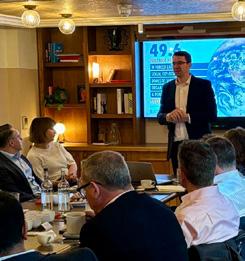
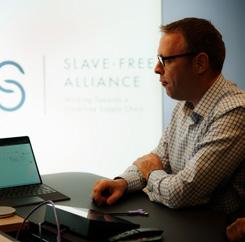
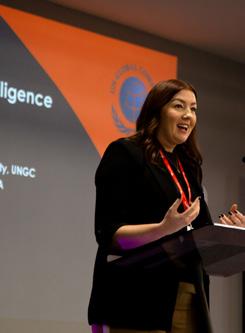
In early 2025, Slave-Free Alliance collaborated with our partners Exiger and Zero9 to host a Chief Procurement Officer roundtable event on modern slavery and labour exploitation risks in global supply chains. The meeting in London was hosted by procurement expert Rachael Legg and addressed by our CEO, Tim Nelson, before a wide-ranging discussion on the role of the procurement function in preventing exploitation in supply chains, and the barriers to doing so effectively. Slave-Free Alliance Consultancy Director, Rachel Hartley, also spoke at the event, saying: “Don’t just ask if your suppliers have a policy. Ask if you’d actually know if something was going wrong. Doing something imperfectly is better than doing nothing at all: silence and fear are what sustain exploitation.”
Slave-Free Alliance is marking our work with one of our largest member businesses, global pharmaceutical company AstraZeneca, by publishing a new case study together. AstraZeneca first joined in January 2019 and the partnership has developed since then to cover complex human rights risks at a global level, supplier and site assessments, supplier training, and a range of other services. Tanya Murphy, Associate Director of Compliance at AstraZeneca, says: “All companies have a duty to conduct business responsibly, respecting both human rights and the right to a healthy environment. At AstraZeneca we take this commitment seriously and collaborate with third parties who share these values.” The full case study, with a focus on a series of distributor site assessments, will be available soon on the SFA website.
‘The
More than 120 delegates from SMEs to FTSE100 firms gathered at Slave-Free Alliance’s annual conference, held in Manchester and sponsored by Exiger. Themed ‘A Global Forum for Change’, the event focused on OECD Due Diligence Guidance, upcoming legislation, and practical steps to address human rights risks. Speakers from John Lewis Partnership, VF Corporation, SSE Renewables, and Tony’s Chocolonely shared real-world insights, while networking and collaboration were central throughout the day. UK Anti-Slavery Commissioner Eleanor Lyons praised attendees’ commitment, urging businesses to work with highrisk suppliers to protect workers. SFA Director Marc Stanton emphasised the need for courage and board-level buy-in to drive meaningful change. The conference showcased how businesses are proactively identifying risks and embedding ethical practices, reinforcing Slave-Free Alliance’s mission to unite organisations in the fight against modern slavery.
17th March 2026 | London
Human rights violations in supply chains are no longer isolated concerns. They threaten operations, reputations, and resilience. Ethica 2026 convenes 300+ senior leaders across legal, procurement, compliance, and sustainability to chart the future of ethical supply chains.

Find out more and register
ethica.live
Slave-Free Alliance is proud to have worked with more than 150 businesses
Here are just some of our current members:



















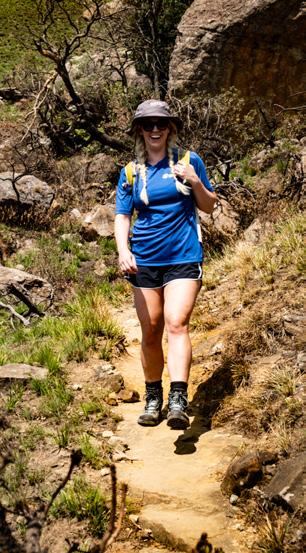
Our 2024 Extreme Challenge trek took place in the amazing Drakensberg mountain range in South Africa, raising funds and awareness for our work. These are the words of one of the team members, Theresa:
“Something that’s really been important to me throughout my life has been the value of public service: focusing on something that’s going to help others or give back to a community. A lot of people struggle to find meaning and satisfaction in life when they are pursuing things that only benefit themselves or their immediate family.
And, at least for me, the idea of public service has been really helpful in helping me find missionoriented work that I find very satisfying, very fulfilling. I remember the day that one of my colleagues mentioned the Extreme Challenge to me on the day I saw it, I committed to sign up for it!
I really felt very drawn to supporting the mission, fundraising for this organisation that’s doing incredible work, and then also coming out here, meeting new people, being in an unfamiliar place and really doing something that I’ve never done before. It’s really this mission that is committed to helping people, and I think that’s incredible. "


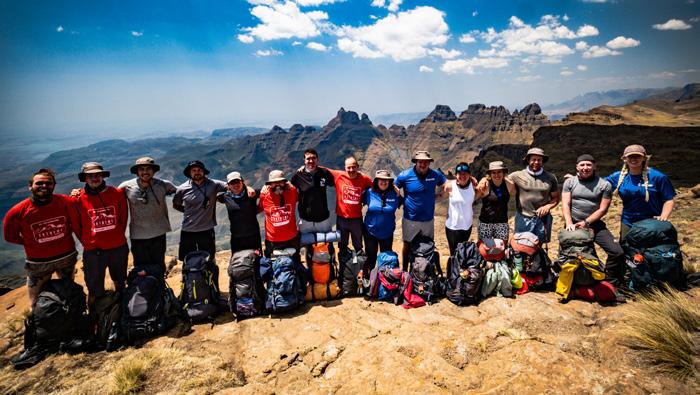

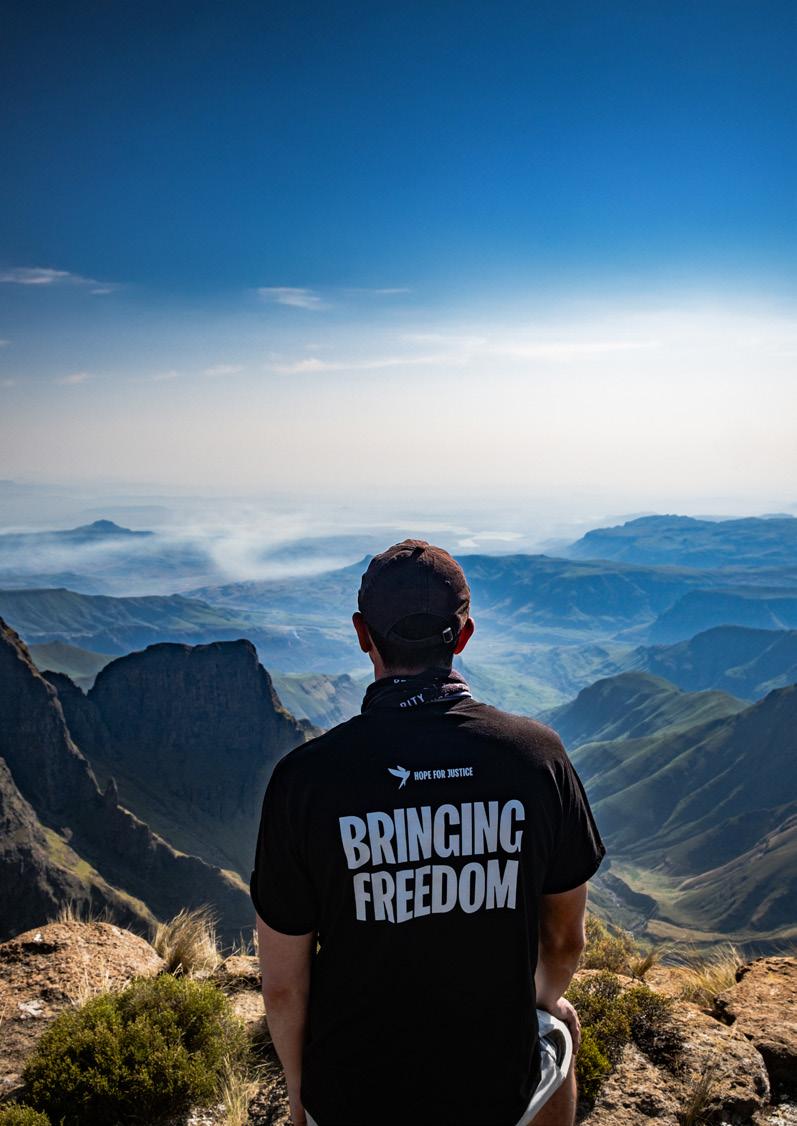
Applications are now open to join the 2026 Extreme Challenge team! See the back page for details.
Reflecting on the past year, it is clear why Hope for Justice continues to be recognised as one of the world’s most impactful anti-trafficking organisations. Our reach --- more than 150,000 people touched in some way by our work --- speaks for itself, and I am also proud to see the growing presence of our experts on global platforms and in policy discussions. Increasingly, legislation and strategic frameworks bear the mark of our frontline insights and expert recommendations.
I’m incredibly proud of what Hope for Justice has accomplished despite the financial headwinds that have challenged the entire charity sector. Our Executive Team has navigated this with integrity and a clear focus on long-term sustainability and the people we serve, without sacrificing our deeply-held values nor compromising on our commitment to safeguarding in our programmes, recruitment and day-to-day work.
I want to express deep gratitude to our staff, volunteers, and supporters for their tireless efforts, and to our
donors, businesses, trusts, churches and partners for their unwavering generosity. I also want to thank the Board members who completed their terms this year – your contributions have been invaluable – and welcome those newly joining us, bringing fresh perspectives and energy.
Every time we gather, we hear stories of lives transformed. These moments are deeply moving and remind us why this work matters so much. Behind every statistic is a person who has found freedom, and that’s what drives us forward.
I’m hopeful and energised about the future. Together, we remain committed to the vision of a world free from slavery – and I believe that together, we will get there.

‘Foluke Ajayi Chair of Trustees

















Embark on an unforgettable adventure with Hope for Justice CEO Tim Nelson and a team of passionate changemakers. Over seven days, you’ll trek through some of Canada’s most breathtaking landscapes while raising vital funds to fight human trafficking.